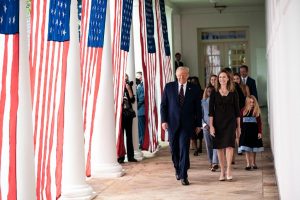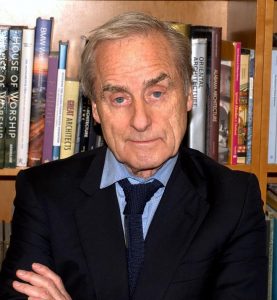28 Sep 2020 | News
[vc_row][vc_column][vc_column_text]

The White House, WIkiCommons
After the death of Ruth Bader Ginsburg, President Donald Trump was quick to fill the hole left by her on the Supreme Court.
As he nominated Amy Coney Barrett for the role over the weekend, Trump called Justice Ruth Bader Ginsburg “a true American legend…a legal giant, and a pioneer for women”.
But what of Coney Barrett?
Announcing his choice for the vacant role, the president said Coney Barrett possessed “a towering intellect, sterling credentials, and unyielding loyalty to the constitution”.
As with any nominee to the Supreme Court, there has inevitably been a focus on Barrett’s stance on a multitude of issues, including particular scrutiny on key issues such as abortion and LGBT rights. However, Coney Barrett’s stance on matters of free speech has been difficult to determine.
As the Supreme Court acts as the USA’s highest court, its rulings on all matters, not just free speech, are vital. The highest court in the land has the final say and therefore, for Index, exactly where each judge stands on their own personal interpretation of the First Amendment is of paramount importance to judging the extent of the limitations to free speech.
The Institute for Free Speech – an organisation set up to “promote and defend the First Amendment” – recorded the actions of the initial candidates, for the position including the successful nominee Coney Barrett, in an attempt to gauge their overall position on free speech law. Coney Barrett does not have extensive records on dealing with cases concerning the First Amendment, but research done by IFS concludes that there are positive signs among what little cases there are.
Coney Barrett, currently judge of the United States Court of Appeals for the Seventh Circuit, has been involved in a number of free speech cases since 2018. IFS reports that “Barrett may be willing to expand free speech protections in limited but nevertheless important contexts”.
But the 48-year-old’s record on dealing with whistle-blower cases has been mixed. In August this year, Coney Barrett’s court favoured the First Amendment and the right of a public employee to raise alarm. However, in the case of Kelvin Lett, a Chicago investigator who refused to change a police report under direction from his supervisor, Coney Barrett ruled: “Lett may have had a good reason to refuse to amend the report [but this] does not grant him a First Amendment cause of action.”
Coney Barrett has also faced scrutiny over her faith, with some questioning if her Catholic faith hinders her decisions. Pro-choice activists have consequently raised concerns over her views on abortion rights and whether she will curtail freedoms in that respect. That said, in an interview earlier this year, the judge stated: “I think one of the most important responsibilities of a judge is to put their personal preferences and beliefs aside. Our responsibility is to adhere to the rule of law.”
Conservative issues and tensions in the country have heightened since the Black Lives Matter protests erupted in May, after the killing of George Floyd. According to Fox News’ Harmeet Dhillon, there is clear friction “between government speech and the creation of public forums for expression” regarding the use of murals by BLM protestors.
Coney Barrett, a conservative herself, could well be ruling on this issue should it face the Supreme Court. The Washington Post has been clear to the point out that the death of Bader Ginsburg was a clear opportunity for conservatives to “cement their dominance” with a 6-3 majority on the court.
While Coney Barrett herself insists that personal beliefs should be kept aside, the majority may prompt conservatives to bring back more contentious issues to the court. The Post said: “The court’s conservative wing has outvoted liberals to carve out religious exemptions from federal laws; to strike down campaign-finance regulations as violations of the First Amendment; and to allow gerrymanders under the view there was no way to determine when a partisan legislature had gone too far.”
The jury, it seems, is still out, which is worrying for us at Index. The question of her commitment to the First Amendment and what it protects for freedoms more generally is of critical importance. Of course it comes at a crucial time, after years of a Trump administration in which freedoms, in particular of the media, have been chipped away.[/vc_column_text][three_column_post title=”You might also like to read” category_id=”5641″][/vc_column][/vc_row]
25 Sep 2020 | Opinion, Ruth's blog
[vc_row][vc_column][vc_column_text]

Index patron and friend Sir Harold Evans, photo; David Shankbone, CC BY 3.0
On Wednesday evening a legend passed away. Sir Harold Evans.
Harry wasn’t just a proper newspaper man, he was the staunchest of advocates for free speech both in the UK and across the world. But, most importantly, at least for us, he was part of the Index family, as a long-standing patron, friend and supporter.
Many people have written their personal stories of Harry in the last 48 hours, their experiences of a great man who embodied the best of journalism. A journalist who was fearless in challenging the establishment and shining a light on some of the most appalling scandals of his age, re-inventing investigative journalism, ensuring that his work changed minds and the law. A publisher who changed the political landscape.
Very few of us will leave such an awe-inspiring legacy.
Most importantly Harry was brave and was prepared to use his position to not only help others by exposing injustice but by ensuring that the voice of the victims was heard – most notably in his work with survivors of the thalidomide scandal.
From an Index perspective, Harry didn’t just seek to protect free speech, he relished using it. He was the first editor in British history to ignore a government D-notice, when he believed that the government were seeking not to protect national security but rather their own reputation. It’s because of him that we know the name of Kim Philby, the traitor who acted as a double agent. He stood up to the government and exposed a national scandal. In this, and on so many other issues, he published without fear or favour.
You can read Harry on the pages of Index writing about the censorship of photographs, anti-Semitism in the Middle East and forgotten free speech heroes. We were honoured to have his support and we are so saddened by his loss.
Our thoughts and prayers are with Harry’s family, friends and colleagues – may his memory be a blessing for all of them.[/vc_column_text][three_column_post title=”You might also like to read” category_id=”13527″][/vc_column][/vc_row]
28 Aug 2020 | News
With attacks on free speech occurring across the world from Belarus to Zimbabwe, Xinjiang to Poland, it would be easy to think that our role is to stand up to tyrants and dictators abroad and stand with those who are leading the fight to make sure that they have the right to have their voice heard. And of course, you’d be absolutely right. Index was established to be a voice for the persecuted and to shine a light into the darkness, to give hope to writers, artists and scholars who were and are systematically being silenced. That is our core work and always will be.
But in Stephen Spender’s founding op-ed, in The Times on 15 October 1971, he made it clear that attacks on free speech can have a domestic feel to them too, and Index won’t shy away from challenging censorship wherever we find it.
“There are problems of censorship in England, the United States, and France, for example. There is the question whether it is not right for certain works to be censored or at any rate limited to a defined readership. The problem of censorship is part of larger ones about the use and abuse of freedom,” wrote Spender.
Which brings me to new legislation currently working its way through the Scottish Parliament – the Hate Crime and Public Order (Scotland) Bill. I don’t believe that our basic rights to free speech and freedom of expression does, or should, give us the right to incite hate or violence. There are always consequences to our actions. But these consequences have to be fair and proportionate and of course in the sphere of free speech not hinder people’s right to engage in debate or to use their voice. There must be no chilling effect. The proposed legislation does not meet this bar.
The bill directly undermines freedom of expression in Scotland. Artistic expression is challenged and our rights to engage in public debate would be threatened with potential prosecution for “stirring up hatred”. The legislative language is so vague that someone could be charged with a criminal offence (with a maximum seven-year prison tariff) if an individual’s actions were deemed to be insulting or offensive, with no consideration of the intent behind the action. Comedians could face criminal proceedings for insulting their audiences, commentators for exploring issues of gender or even for discussing religion.
We all want an end to hate speech, we all want to live in a society where people feel safe and secure, but we also want live in a country where our views are respected even when we are in the minority, where debate is welcome and celebrated, and where every one of us can speak without fear or favour.
If this legislation passes un-amended that will no longer be the case in Scotland and would set an awful precedent for the rest of the UK. Index is opposed to this legislation and will keep working with colleagues in Scotland to get the changes we all need to protect our basic human right to free speech.
Read our letter to the Scottish parliament here contesting the wording of the bill, signed by Rowan Atkinson and other public figures.
23 Jul 2020
Free Speech is Not For Sale campaign is launched in partnership with English PEN. A report done as part of the campaign highlights the problem of so-called libel tourism and English law of defamation’s chilling effect on free speech. As a result of debate following the report’s suggestions, UK Justice Secretary Jack Straw pledges to make English defamation laws fairer.


